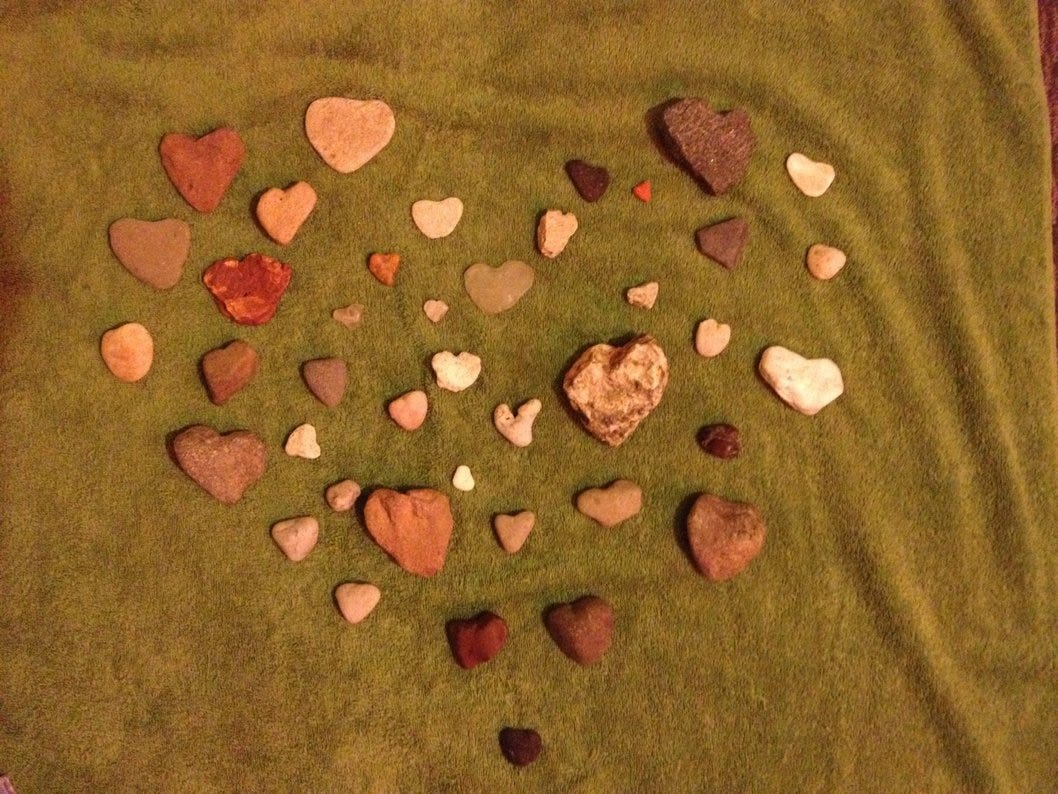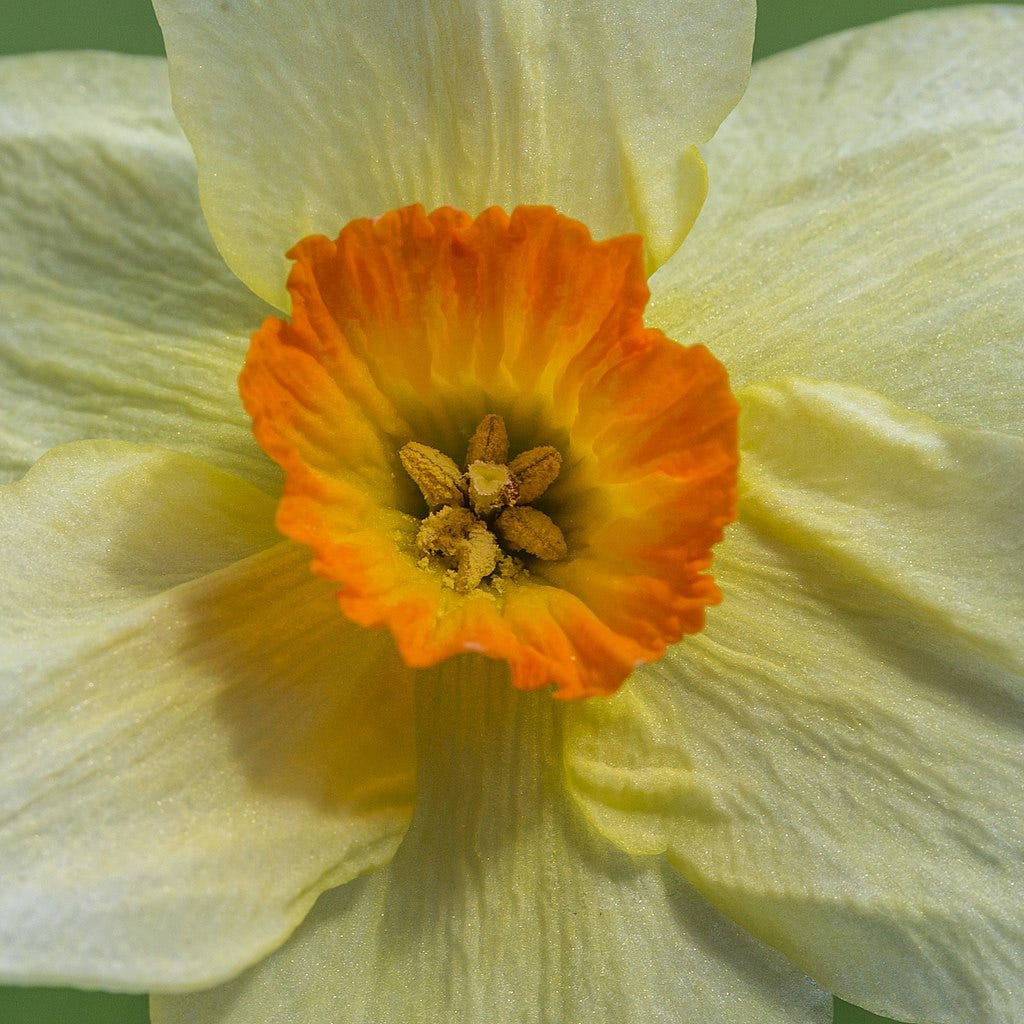PYRAMID SCHEMES
The first thing I do when I post my own essays here is give them a like. Which on this platform comes in the form of clicking to color an empty outline heart red. It’s satisfying to en-redden a heart on your own work. I might feel a little silly, selfish and even superficial for a second, but then remind myself this is a simple and symbolic act of self-love. All the better buffered to then throw myself out to the wolves—or more typically, fingers crossed, kind readers that you are!—of this still-scary void of pressing “publish.” As a person who has spent her life on various beaches and riverbeds around the world hunting for heart-shaped rocks, I also find this gesture very romantic.
Liking yourself first should be #1 on any list before doing anything. In the mirror before you go to the office or on a date, as a sort of self-fluffing, “knock ’em dead, killer!” with a wink, or as they say when the plane is going down, give yourself the oxygen mask first. If coupled and with kids, take care of yourself before your partnership, your partnership before your spawn. It’s not a hierarchy of value, but rather a pyramid for which you are the starting pinnacle point, read from top to bottom.
The lowest layer of that, resting against the sandy base, and no offense to them, might be the sort of “friends” you amass in social media. While I used to reserve the old-timey Facebook for people I actually knew IRL, I’ve just decided—since this newsletter and my compulsion to share it—to just accept anyone and let it rip. Ironically this empty quest of gaining many more “friends”/more potential likes/maybe even few actual readers has freed me from any self-consciousness or effort/time on Facebook—as I’ve just decided it’s business now and released any personal attachment and/or need for awkward family photos to which my kids now object to anyway. The returns from what I get from more “attention” there are slim vs. how the fewer likes/comments I get here on Substack are vastly more substantial and always enrich the conversation. Among the hundreds of readers I’ve accrued here, there are the satisfying sturdy handful that are real, deep, inspiring and motivating. One of my favorite lifetime mantras: what you focus on expands. My likes are small but meaningful, starting with that first one from me on the brave apex.
This is not the same as Maslow’s Hierarchy of Needs pyramid, which reads from the base up—and you know I love a shape for my self-help. According to this handy psych model, basic foundational needs must be met before being able to move up the pyramid to satisfying the more complex. First, the physiological (food, water, warmth, rest), then safety, then belonging/love from others, then esteem, then at the peak at last comes the self-actualization (achieving one’s full potential). Perhaps in this pyramid scheme, we can consider self-love one of the basic bare-minimum necessities, right down there with rest and water, or even just the icing holding the whole rainbow cake and all its layers together.
AUTOEROTIC
There’s definitely an industry fueled on the trendy buzz word of “self-care” but I wonder how much this remains a fantasy for frazzled moms who want to believe in the act, if only they had the time, finances and wherewithal to make it happen. Self-care, like the top-tier dream of self-actualization, feels like a luxury of privilege. I mean, I would love to take a bath but that’s a lot of time to fill that tub and float in there with the stray hairs and pink sea salts when I have to hurry up and earn some money to afford cereal.
In all my relationship research—because you need to fortify yourself with as much information and support as you can before embarking on this nefarious modern mission of seeking a mate—there is often the important refrain of getting to a place where you are happy alone first. Truth be told, I am far happier alone generally, but once I’ve had a taste of some romance (or perhaps gotten addicted to that dopamine hit from matches on an app or a thread of texts popping through the work day, not to mention dinners, compliments, affection) it’s hard to jump off the train. Once tempest tossed, I can retreat again to finding my fix alone as an insanely productive busy bee, up and down the stairs I spin looking for the next thing to concoct or fix. The dream I chase of late might involve less spin and more forward-motion, in finding someone who complements me so well that we link arms and mission-quest both together and apart. I explored a bit in the lonely trilogy the concept of pairing two “solitaries”: I picture them walking parallel looking toward the same direction when they aren’t busy tending their separate houses.
This may all seem obvious, but, same as successful relationships requiring work, you gotta treat self-love seriously and study it like it’s your job. According to the Brain and Behavior Foundation,
Self-love is a state of appreciation for oneself that grows from actions that support our physical, psychological and spiritual growth. Self-love means having a high regard for your own well-being and happiness. Self-love means taking care of your own needs and not sacrificing your well-being to please others. Self-love means not settling for less than you deserve.
This might come in the form, as the article continues, of setting healthy boundaries, taking breaks at work, putting the phone down to connect to people in person, being creative, balancing healthy eating with sometimes indulging, refraining from self-judgment, forgiving your own lapses. Wouldn’t hurt to throw some literal autoeroticism into your self-love practice either.
Self-love or self-care practices and benefits:
Becoming mindful. People who have more self-love tend to know what they think, feel, and want.
Taking actions based on need rather than want. By staying focused on what you need, you turn away from automatic behavior patterns that get you into trouble, keep you stuck in the past, and lessen self-love.
Practicing good self-care. You will love yourself more when you take better care of your basic needs. People high in self-love nourish themselves daily through healthy activities, like sound nutrition, exercise, proper sleep, intimacy and healthy social interactions.
Making room for healthy habits. Start truly caring for yourself by mirroring that in what you eat, how you exercise, and what you spend time doing. Do stuff, not to “get it done” or because you “have to,” but because you care about you.
After writing so much lately about going solo, which always actually seems to bring up the societal connections underpinning the solitude, I appreciate the angle that self-love is also at its core quite communal. A mom who can’t take care of herself can’t do very well by her kids either. A solid individual will prove a far better partner. A happy person at home will more greatly contribute to the office (note that establishing a national four-day work week would really help on this!). Part of self-care is being intimately social. You are a better friend and lover if you can kinder to yourself. My ex-boyfriend was a cabinet of minor bad habits. I often thought it was because he didn’t love me enough that he couldn’t throw them away, but more than that it was a symptom of not loving himself enough to be able to get that far. And certainly any nagging on my part didn’t help this cause.
We do family therapy here in my household and one daughter is very invested in the blame game. Everyone else is wrong. Everyone at fault. Try as I might I can’t will her to “be kinder” in the form of begging her multiple times a day. Begging is the worst way to get what I want in this regard; I know I have to be the change I wish to seek. Be the alpha kindness and it all will trickle down in the reactions I solicit. I’m trying to mirror the best version of herself rather than the worst and then the worst, in time, might just recede.
SELFIE DYSMORPHIA
This article on self-love in Forbes (because certainly love makes for good business!), suggests specifics like giving yourself a compliment, speaking to yourself as you would with a friend, celebrating the small wins, limiting time on social media.
Social media is the kicker. The dirty fuel of likes. Teen girls get depressed if they don’t get enough; it’s become a measure of their worth. And the selfies they post to win likes seem to be the opposite of self-love. These enticing thirst trap pics might look like self-love, but are more often posed, filtered, and performative. An empty quest for attention, adoration, acceptance, fitting in. The pout of copy cat puffed lips and overly-made up faces made famous and all too quotidian by those damn Kardashians.
An article from the Child-Mind Institute asks “What Selfies are Doing for Self-Esteem?” and the answer is grim. A terrifying statistic—“the average woman between 16 and 25 years old spends over five hours a week taking (and improving!) selfies”—has a new syndrome its spawned, selfie dysmorphia, being over-fixated on the perceived flaws in your self-portrait. While the typical girl might take seven shots to get one good one, Kim K. reports taking 15-20 behind each. “Then there are the filters, not to mention real-life alterations like changing lighting or touching up makeup. There are also apps you can use for more drastic procedures like changing your bone structure, slimming your waistline, erasing pimples, and more.” With the amount of hours teens spend online looking at the output of this, being effectively airbrushed has become the norm they become accustomed to seeing, and comparing themselves to. Obviously no one measures up to these standards in reality, and self-esteem is plummeting along with a rise in depression, stress and anxiety. Selfie dysmorphia can easily grow into body dysmorphia, where you and your flesh and not the just the picture of it are not good enough.
Speaking of that virus K clan, the other buzz word of our times is narcissism. Overused though it is, it’s a sign of the times itself as we live in a very solipsistic, self-obsessed culture made far worse by social media, often, ironcially, the most antisocial of mediums. Narcissism of course stems from that myth of Narcissus staring at his reflection (which nowadays, we can liken to the dreadful bathroom mirror selfie). From Wikipedia:
In Greek mythology, Narcissus (/nɑːrˈsɪsəs/; Ancient Greek: Νάρκισσος, romanized: Nárkissos) was a hunter from Thespiae in Boeotia (alternatively Mimas or modern day Karaburun, Izmir) who was known for his beauty which was noticed by all, regardless of gender. According to the best known version of the story, by Ovid, Narcissus rejected all advances, eventually falling in love with a reflection in a pool of water, tragically not realizing its similarity, entranced by it. In some versions he beat his breast purple in agony at being kept apart from this reflected love, and in his place sprouted a flower bearing his name.
The character of Narcissus is the origin of the term narcissism, a self-centered personality style. This quality in extreme contributes to the definition of narcissistic personality disorder, a psychiatric condition marked by grandiosity, excessive need for attention and admiration, and an inability to empathize.
THE EMPATHIC IMPERFECT
Healthy self-love is the opposite of narcissism. It makes you more empathetic. From that Forbes article and Dr. Elizabeth Jarquin, marriage/family therapist:
Not only does self-love improve your relationship with yourself, but also with others. “When we engage in these practices, we feel better overall and how we interact with others is a more positive experience,” says Dr. Jarquin.
Indeed, research suggests taking care of yourself makes you more empathetic to other people. Dr. Jarquin adds that empathy comes from showing compassion and patience, but it’s hard to do so when you have little empathy for yourself. When you treat yourself with kindness, the practice extends to how you treat others.
When you practice self-love, Dr. Jarquin says you become less emotionally reactive. Many self-love practices teach you how to calm down instead of immediately reacting to an upsetting stressor. “You can take the time to stop and think about what’s going on, and how you’re going to respond versus just reacting,” she explains. People who practice self-love also show increased resilience when things don’t go their way. “When you feel terrible or angry, practicing self-love on a day-to-day basis will help you to respond in a different way and bounce back quicker,” she says.
The perfection quest is killing us and this slick surface can also include all the branding of self-care and the false packaging of selfies. On the dating apps, if anyone’s pictures are too good, I bristle. Should he even be real and not AI or a catfish, he’s still too surface for me. It’s a point of pride that I’m bad at selfies and don’t care to be better. One’s arm is not long enough to get that good angle and I am not ever investing in any selfie stick or beating my breast purple in mirrors/pools. It’s so easy to fall prey to thinking any self-portrait isn’t good enough since there’s always this dissonance of it not matching the way you feel, so I lean toward just not sharing much or at all.
Or might we just embrace unflattering photos the way we do this time of year with those damn ugly sweaters? I like this idea I heard of a family who shares the worst photo of the year of themselves for their holiday card rather than the super-fabricated best. How about establishing a new standard of keeping it real, owning flaws, and having fun with this silly game of life on this weird round ball we inhabit. It’s a fine line as always. Love—but not dwell on—yourself first, and then please, quickly, move on to smell the narcissus around you.









I love this topic. I feel like too many women see self-care as something they purchase, a material good or service, when the most basic form of self-care is adequate sleep, nourishment, rest and movement. These same women wear their lack of self-care as a badge of honor, “ I’m so busy, I don’t have time for… “ They are always upset that their self-sacrifice goes unnoticed. Yet they don’t want to change it, because they fully bought into the idea of perforative mothering.
I really like the oxygen mask analogy, and I use it all the time whenever I'm talking with someone unfamiliar with the concept of self-love. Great work bringing this out into the light of day!